|
|
|
Sort Order |
|
|
|
Items / Page
|
|
|
|
|
|
|
| Srl | Item |
| 1 |
ID:
137389
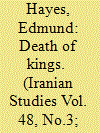

|
|
|
|
|
| Summary/Abstract |
Ferdowsi's Shahnameh was not conceived as a national epic, but it does encapsulate another kind of group identity: it provides context and meaning for the glorious pedigree of the Iranian aristocracy. Ferdowsi himself was a member of the Khorasani dehqān gentry whose collective effort in the tenth century CE was turned towards preserving and reshaping their own history and literary heritage in the terms of the new era. This article analyzes the final section of the Shahnameh, dealing with the reign and death of the last Sasanian king, Yazdegerd III. As such, this section provides crucial clues for the function of the Shahnameh as a means to construct meaning for Ferdowsi's own group in his own time. The description of this crucial moment in history, pivoting between the era of Iranian kingship and the Islamic era, suggested possible modes for interpreting the present. The study reads this section of the Shahnameh with close attention to the use of the word nezhād (“lineage”), which circumscribes the identity of both the aristocrats of Ferdowsi's present, and the kings and heroes of the mythic past. In doing so, the transition between eras appears as a tragedy of nezhād, as the Sasanian dynasty is extinguished, raising permanent existential ambiguities for the entire class of Iranian gentry whose genealogies were associated with it.
|
|
|
|
|
|
|
|
|
|
|
|
|
|
|
|
| 2 |
ID:
067244
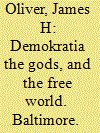

|
|
|
|
|
| Publication |
Baltimore, Johns Hopkins Press, 1960.
|
| Description |
viii, 192p.Hbk
|
|
|
|
|
|
|
|
|
|
|
|
Copies: C:1/I:0,R:0,Q:0
Circulation
| Accession# | Call# | Current Location | Status | Policy | Location |
| 005957 | 938/OLI 005957 | Main | On Shelf | General | |
|
|
|
|
| 3 |
ID:
112385
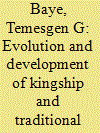

|
|
|
|
|
| Publication |
2012.
|
| Summary/Abstract |
Many kingdoms and states were created and consolidated in Ethiopia and the Horn by conquest, but many others developed through more peaceful borrowing and assimilation of ideas and institutions from neighbors, and even through internal developments, stimulated by population growth, improved production, the need to organize and mobilize for migration, or protection against new external threats.
|
|
|
|
|
|
|
|
|
|
|
|
|
|
|
|
| 4 |
ID:
145015
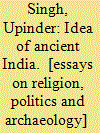

|
|
|
|
|
| Publication |
New Delhi, Sage Publications India Pvt Ltd, 2016.
|
| Description |
xlii, 439p.: tables, figureshbk
|
| Standard Number |
978935150646
|
|
|
|
|
|
|
|
|
|
|
|
Copies: C:1/I:0,R:0,Q:0
Circulation
| Accession# | Call# | Current Location | Status | Policy | Location |
| 058656 | 934/SIN 058656 | Main | On Shelf | General | |
|
|
|
|
| 5 |
ID:
137390
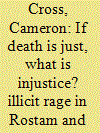

|
|
|
|
|
| Summary/Abstract |
This is a comparative study of anger and narrative control in two tragic stories cast in an epic-heroic register, the “Tale of Rostam and Sohrab” of Ferdowsi's Shahnameh and “The Knight's Tale” of Chaucer's Canterbury Tales. The narrators of both stories are heavily invested in upholding a certain normative interpretation of the events they recount, a fatalistic worldview that justifies itself through the necessarily agnostic optimism that these senseless catastrophes gain meaning when situated within a greater order that is beyond the capacity of man to comprehend. The emotional responses of outrage and grief therefore have no legitimate place in this worldview, and must be submitted to a process of rationalization and violent suppression in order to be kept in check. However, this same process also reveals the underlying aporias of its own normative logic, producing a subtextual counter-narrative that resists and undermines the dominant voice of the text. The resulting fragmentation and narrative collapse provides a fruitful opportunity to investigate how both texts respond to a crucial ontological topic in medieval literature and philosophy: what does it mean to be an autonomous subject within a divinely ordered universe, and how can one distinguish justice from tyranny in a world entirely governed by fate?
|
|
|
|
|
|
|
|
|
|
|
|
|
|
|
|
| 6 |
ID:
103152
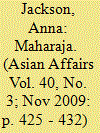

|
|
|
|
|
| Publication |
2009.
|
| Summary/Abstract |
A curtain-raiser for the current "Maharaja" Exhibition at the Victoria and Albert museum, which explains the evolution of Indian concepts of kingship from the early18th to the mid-twentieth centuries. The article describes how pageantry and symbolism formed part of the essentials of kingship, together with martial prowess and patronage of the arts. The British Raj thus took over a valid existing pattern of behaviour, which however became increasingly difficult to sustain and justify as independence loomed.
|
|
|
|
|
|
|
|
|
|
|
|
|
|
|
|
| 7 |
ID:
168814
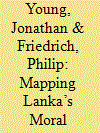

|
|
|
|
|
| Summary/Abstract |
This article analyses the ways in which a little-known Sinhala text called the Ravana Rajavaliya articulates a moral topography of late medieval Sri Lanka. Rather than expressing a kind of all-consuming xenophobia in response to social and cultural difference, the text indexes a set of local political responses to the surge in social mobility occasioned by changing patterns of trans-regional circulation in Sri Lanka’s southwest. We argue that ‘others’ are represented in terms of proximity to a generalised moral order, one which highlights desirable forms of selfhood as instruments for assimilation within an emerging state society.
|
|
|
|
|
|
|
|
|
|
|
|
|
|
|
|
| 8 |
ID:
084232
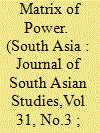

|
|
|
| 9 |
ID:
084233
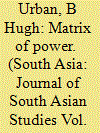

|
|
|
| 10 |
ID:
163115
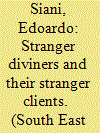

|
|
|
|
|
| Summary/Abstract |
Marshall Sahlins argues that kings are ‘stranger kings’, as they typically originate from outside their kingdom or from the celestial realms. He advances that kings draw authority precisely from an ability to appropriate a geographic and cosmological Other for the benefit of their subjects. With this article, I propose that, in contemporary Thailand, a kingdom ruled by a Buddhist monarch, this defining ability of kings spreads to commoners. An ethnographic study of diviners (mo du) and their clients (luk kha) in Bangkok reveals that Thai Buddhists routinely make cosmologies. Such cosmology-making entails appropriating foreign and divine forms of knowledge in the manner of kings. I argue that this phenomenon allows commoners to master the idioms of power of Thai Buddhist kingship. This results in tensions between commoners, and places them in an ambiguous relationship with the monarchic state.
|
|
|
|
|
|
|
|
|
|
|
|
|
|
|
|
|
|
|
|
|